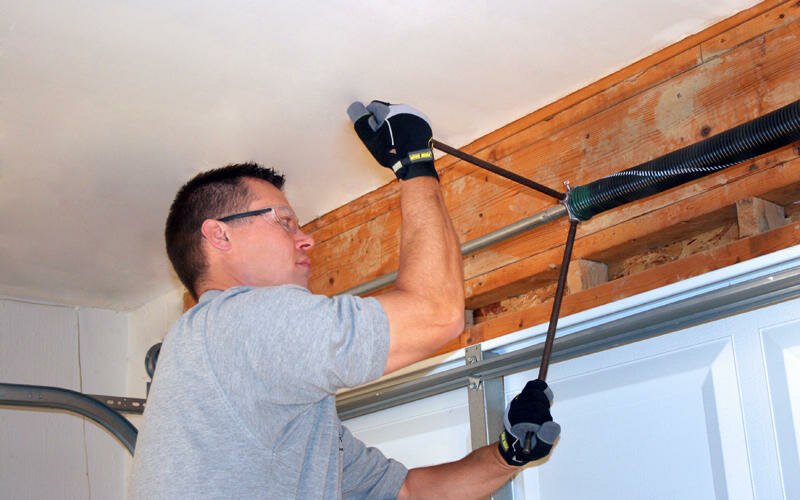Garage doors are one of the most frequently used components of a home. Opening and closing multiple times daily, they bear the weight of repetitive motion and are subjected to varying weather conditions year-round. While much attention is paid to the motor, sensors, and aesthetics of garage doors, lubrication is often overlooked.
Regular lubrication is vital in reducing friction, minimizing wear, and extending the life of the door and its many moving parts. Without it, even the most well-installed systems can fall victim to early deterioration and noisy, inefficient operation.
How friction affects moving parts over time
Friction and Its Effect on Daily Operation
Every garage door relies on rollers, tracks, hinges, torsion springs, and cables to move smoothly and safely. As these metal parts interact during each cycle, friction is generated. Over time, this friction begins to degrade the surfaces, leading to grinding noises, resistance in movement, and ultimately, mechanical failure.
Proper lubrication creates a thin protective layer between these components, significantly reducing friction and ensuring quiet, reliable operation. When rollers don’t glide easily within the tracks or hinges start to stiffen, the entire door system is forced to work harder, which puts unnecessary strain on the motor.
Professionals offering Surrey garage door services often emphasize lubrication during routine maintenance visits because it is a simple but powerful preventative measure. Keeping friction low extends the system’s life and enhances safety by reducing the chance of parts seizing or snapping under pressure.
Preventing Rust and Environmental Damage
Garage doors, particularly in regions with fluctuating weather, are exposed to conditions that accelerate rust and corrosion. Moisture, temperature shifts, and road salts can settle on metal parts and begin to eat away at them. Once rust takes hold, it compromises the integrity of the components and causes squeaking, sticking, and premature wear.
Lubrication acts as a barrier that helps repel moisture and slow down oxidation. High-quality lubricants are designed to stay in place even in damp or cold conditions, offering protection that mere cleaning cannot provide. Routine lubrication is essential for torsion springs, which bear the door’s weight and are more vulnerable to cracking and breakage when corroding.
As part of preventative care, lubrication helps create a longer window between major repairs and improves the door’s resistance to the natural wear brought on by the elements.
Extending the Lifespan of High-Stress Components
Not all garage door parts wear at the same rate. Springs and rollers are high-stress components that undergo immense pressure with each use. Without adequate lubrication, these parts wear faster and become more prone to sudden failure.
A snapped spring or a roller derailing from the track can pose a safety risk, resulting in costly emergency repairs. Regular lubrication allows the stress to be distributed more evenly across the moving parts, minimizing the risk of abrupt malfunctions. It also helps maintain balance and alignment, which prevents excess wear on one side of the system. This kind of consistency in performance translates to longer-lasting hardware and more dependable service over time.
The cost of a can of lubricant pales compared to the potential expense and inconvenience of a broken spring or seized bearing. Simple upkeep can distinguish between a garage door that functions smoothly for decades and one that needs constant attention.
Improving Energy Efficiency and Reducing Motor Strain
Another critical aspect of proper lubrication is the way it impacts the motor and energy consumption of an automatic garage door system. When moving parts operate under excessive friction, the opener motor must work harder to complete each lift or lower. This not only consumes more electricity but also accelerates the wear on the motor itself.
Over time, it can cause overheating, degraded performance, and eventual opener failure. Lubrication allows the motor to operate with less effort, conserving energy and reducing noise by reducing resistance within the tracks, hinges, and springs. Homeowners who hear groaning or grinding sounds during operation often discover that dry, neglected parts are the root cause.
Lubrication offers an immediate fix and improves efficiency with each use. Consistent application keeps the motor cooler and reduces the chance of burnout or power surges during operation.
Simple Maintenance with Long-Term Benefits
Applying lubrication doesn’t require complex tools or extensive knowledge. A homeowner with basic awareness and a ladder can reach critical points such as hinges, rollers, and the spring system. It’s important to use lubricants specifically designed for garage doors—these products typically come in spray form and contain additives that help them adhere to surfaces and withstand extreme temperatures.
Over-the-counter lubricants like WD-40, while popular, are often insufficient because they evaporate quickly and don’t offer long-term protection. A proper application every few months can keep the door quiet and efficient year-round. Maintenance routines that include lubrication also allow inspection for signs of wear, rust, or misalignment.
By catching these signs early, homeowners can act before small issues become major repairs. Regular lubrication is not just about preventing squeaks—it’s about preserving the entire door system cost-effectively and efficiently.
Lasting Performance Through Simple Care
Garage door lubrication may seem like a minor task, but its impact on the overall health and performance of the door system is significant. From reducing friction and wear to preventing rust and lowering motor strain, lubrication is pivotal in how long the door functions safely and smoothly. When done regularly, it prevents unnecessary breakdowns, minimizes noise, and maintains the integrity of high-stress components.
By making lubrication a part of standard home maintenance, homeowners gain peace of mind knowing their garage door is protected against daily wear and environmental stressors. In the long run, this simple routine helps extend the system’s life and ensures reliable operation with every open and close.
